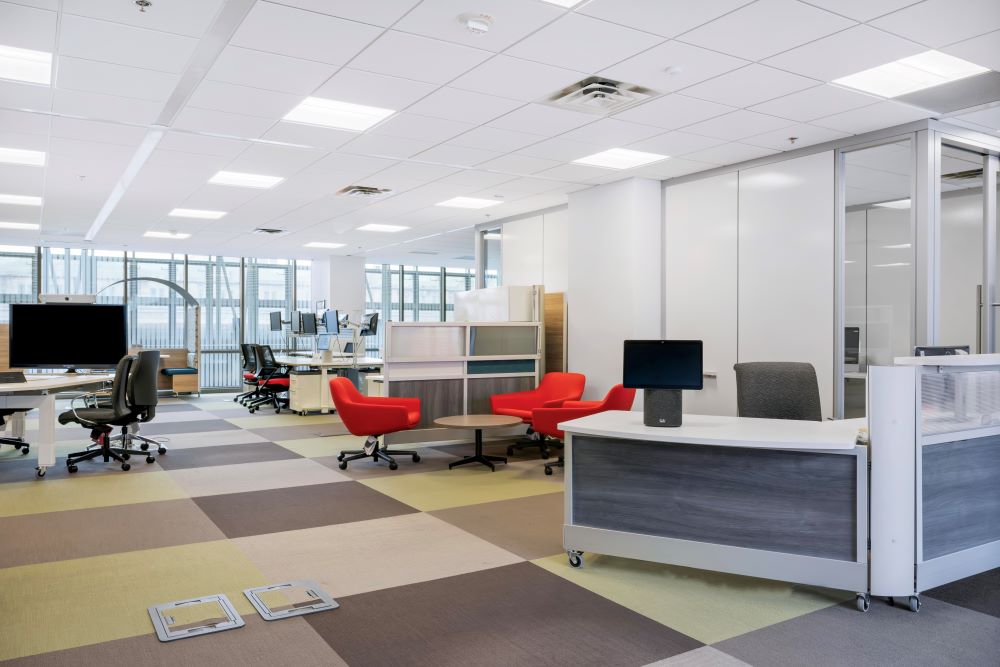Today, the General Services Administration (GSA) and cloud cyber giant Cisco together announced the creation of a new hybrid workspace option for government employees.
The pair just unveiled the GSA’s new Workplace Innovation Lab, a coworking space for federal government workers. A statement called the new lab, located at the GSA HQ near The White House, is a “testbed for future of work technologies” to address current workplace challenges for federal employees like security. Cisco said the space will be technologically secure according to federal standards, which regular coworking spaces are not.
The 25,000-square-foot facility features conference rooms, shared collab space and offices in six suites. Employees can use the coworking space in slots ranging from a single hour to several weeks while visitors can request tours and use the space as well. Alongside Cisco, the GSA partnered with Allsteel, Haworth/Price Modern, Miller-Knoll, Kimball International and Swiftspace/VOE to launch the Workplace Innovation Lab.
Cisco Senior VP and General Manager of Collaboration Devices Snorre Kjesbu said that the goal is to create a seamless workflow between government employees, whether they work in-person or remotely.
“The key thing is to make sure that in a hybrid work environment, you have the ability to bring in people that are remote with people that are present locally, and do that in a way where you don’t build barriers,” Kjesbu told Technical.ly. “That is one of the key things where we think technology plays a huge part.”
At the lab, federal employees will be able to access a variety of video meeting software and the Optimize for My Voice feature, which listens only to the user’s unique voice and ignores background noise. Federal employees will also have options like hotdesking, where workers can book a shared desk through which they can coordinate meetings and calendars. Multiple employees will also be able to place business line calls on a shared phone.
Given the sensitivity of federal work, the space is also designed to be secure. Cisco said it used gigabit ethernet switches and a tool called the Cisco Identity Services Engine to create segmentation in the network, so each agency’s individual info is secure.
“The Workspace Innovation Lab is intended to host employees from many government agencies and obviously cybersecurity is a critical requirement for that,” Kjesbu said.
The hope is that meetings with both remote and in-person participants can still happen seamlessly and securely. With this in mind, Kjesbu hopes the space can be a “magnet” spot that employees want to use, instead of being forced to through an in-office mandate.
“We want to make the office a magnet because there are certain things that are really, really well done in an office space — around innovation, around mentoring, around really being able to build culture,” Kjuesbu said. “So I think what GSA is doing here [is trying] to look at: how do you create that magnet? “
This is not the first time that the GSA has jumped at the chance to offer more flexible work options. In 2021, the agency signed one-year contracts with WeWork, EXPANSIVE, The Yard, Deskpass and LiquidSpace to provide coworking space to employees across the country.
“This shift in capability has resulted in greater flexibility and mission response across the Federal Government,” GSA wrote in its solicitation for the contracts. “GSA is seeking nationwide Flexible Coworking Services (FCS) solutions that provide federal employees with flexible workspace solutions in order to occupy only the space needed in order to meet their missions and promote a responsible use of taxpayer dollars.”
The push for hybrid options means that the federal government can be more competitive in hiring and attracting additional talent. According to a survey from Cisco on hybrid work in government, 66% of government employees feel that flexible work options impact job satisfaction.
”The future of the office workplace is now. We’re imagining it and building it right here in partnership with both industry innovators and our federal customers,” said GSA Administrator Robin Carnahan in a statement. “This is a space where agency decision makers and their teams can experience the latest technologies, equipment and furniture that’s designed to empower federal employees to deliver even more effectively.”







